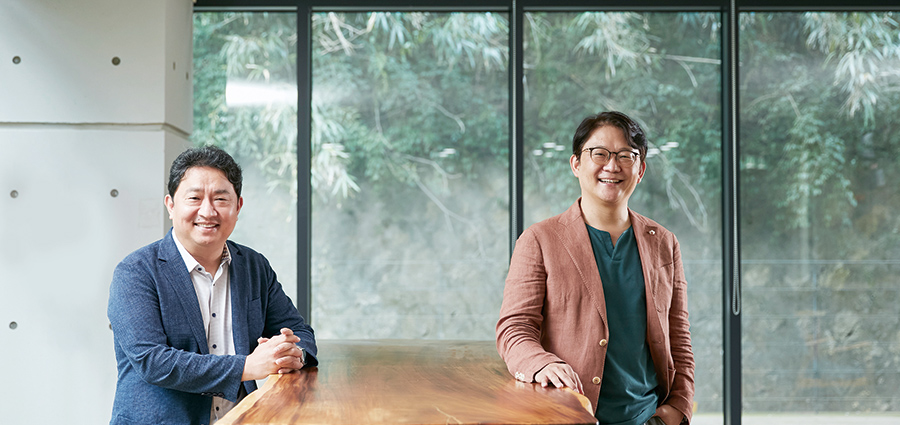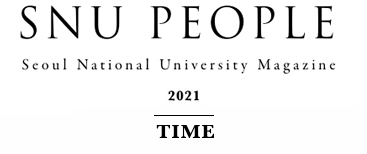Cover
Story
Finding the Future
of Humankind from the Past
Professor Lee, Sukjae of the Department of Philosophy
& Professor Jang, Dayk of the College of Liberal Studies
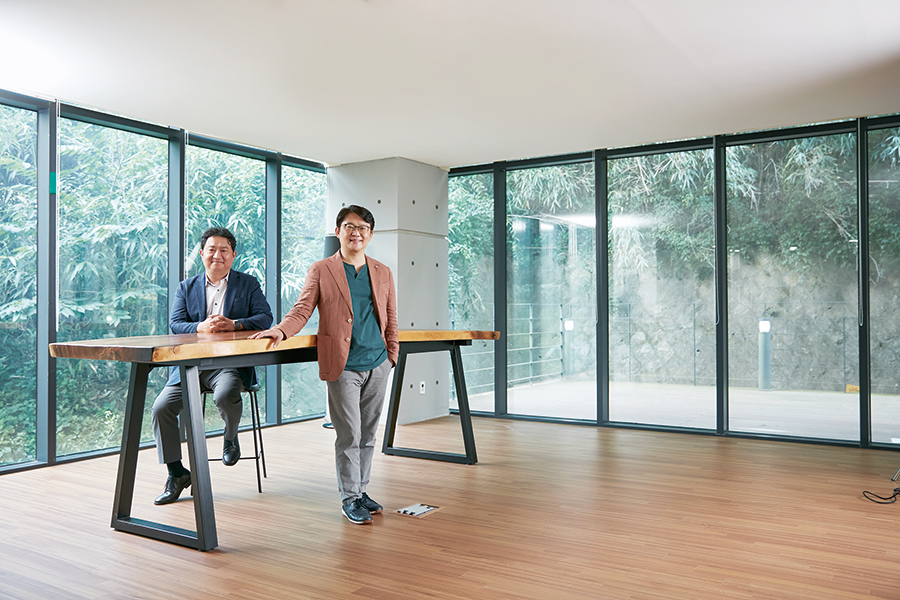
The Spanish Flu, which broke out from a mutant of the bird flu in the United States in March 1918 during the First World War, was spread to Europe and then to the entire world with the migration of the American forces, taking away the lives of 50 million people. About 100 years since then, the humankind once again encountered a risk of an epidemic. Similar events that happen repeatedly have provided what humans should think about throughout hundreds of thousands of years when the humankind has ever existed. We asked questions to Professor Lee, Sukjae of the Department of Philosophy and Professor Jang, Dayk of the College of Liberal Studies about what we have to learn from the cycles found in the flow of time.
Similar Moments Repeated throughout the History of Humankind
Jang, Dayk: вҖҳTime loopвҖҷ is a controversial topic also in evolution. Stephen Jay Gould, an American paleontologist, advocated the viewpoint that вҖҳEvolution occurs by chance and may not be repeatedвҖҷ in his book, Wonderful Life, published in 1989. His view is that if we rewind the tape about the history of life and play it again, the evolution will not lead to Homo sapiens, even if we try that a million times. If the asteroid had not fallen onto the earth 65 million years ago, the dinosaurs would have not been extinct. Then, the world of mammals would have not been opened, and another species other than primates could have emerged. This concept is referred to as evolutionary contingency, which I also agree to. Of course, the scholars have different ideas, but we cannot confidently say that time is simply repeated or flows spirally.
Lee, Sukjae: Time is a concept that is necessary to recognize the change of things, and thus it has been a major topic of the philosophers and scientists from ancient times. Like Professor Jang, I do not agree to the view that time is repeated. However, if we narrow down the width of time to the time that we humankind is aware of, that is, the difficulties involved in the survival of Homo sapiens, it is true that similar things are happening continuously. We always use the word вҖҳunprecedentedвҖҷ when we talk about COVID-19, but epidemics often emerged in the past and dominated the world of the times. Recall the Black Death, Spanish flu, Hong Kong flue, Ebola virus, SARS, MERS, and the swine flu. Infectious diseases that shocked the world have occurred continuously if you see the public health history of humankind. We cannot say for sure that the history is repeated, but we can consider various viewpoints about why similar problems occur repeatedly.
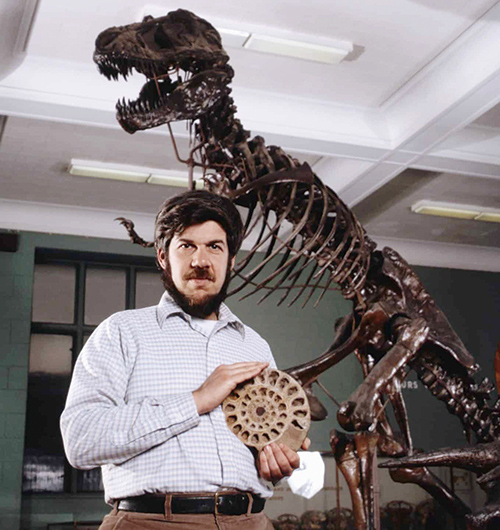
Jang, Dayk: ThatвҖҷs right. The point is not whether there is time loop or not, but why we feel as if there is a time loop. I think that the answer is surprisingly obvious. In the past and present or in the 17th century or even before the Common Era, Homo sapiens has always undergone problems in survival and reproduction. To address the problems, we have to get along well with others and cooperate with them as a social existence, and should be able to avoid dangers from toxic food, predators and infectious diseases. This is called вҖҳadapted problemвҖҷ in evolutionary psychology. Humans have confronted the same problems in any periods of the history, and we act similarly to solve the same problems even in different historical contexts. Recently, we see that metaverse is emerging as a combination of reality and the virtual world, but I think we humans will not act so differently in the metaverse while consuming the contents. As the human nature, seeking survival, remains the same, the nature of our actions will not change, although the patterns may be changed.
Course that Humans Should Take in the Repeated Time
Lee, Sukjae: From the perspective that similar times are repeated in the history of humankind, the time now is similar to the Modern Europe when tremendous scientific accomplishments changed the life of humankind fundamentally. Korea is going through a period like a furnace where the advanced sciences and technologies coexist with the traditional values and the Easter and Western cultures are blended with each other. Confusing it may be though, the time now is an era of active forces, full of expectations. Looking back how we handled the issues of the time in the past, we have to have a proper look at the problems that we have now.
Jang, Dayk: YouвҖҷre right. Talking about the pandemic that you mentioned before, there have always been hate and exclusion of the people who have potential dangers of infection during a pandemic. Regardless of the time, that represents the emotional and cognitive confusion of humankind, and is a natural reaction for survival. But, itвҖҷs an important question if we can overcome the COVID-19 by means of hate and exclusion, as we did in the past. Modern people exchange with others actively and are unable to live independently. So, solving the problem requires the empathy that only humankind has, or the ability to put ourselves in someone elseвҖҷs shoes. I think that this ability is the solution that was needed during the pandemics in the past as well.
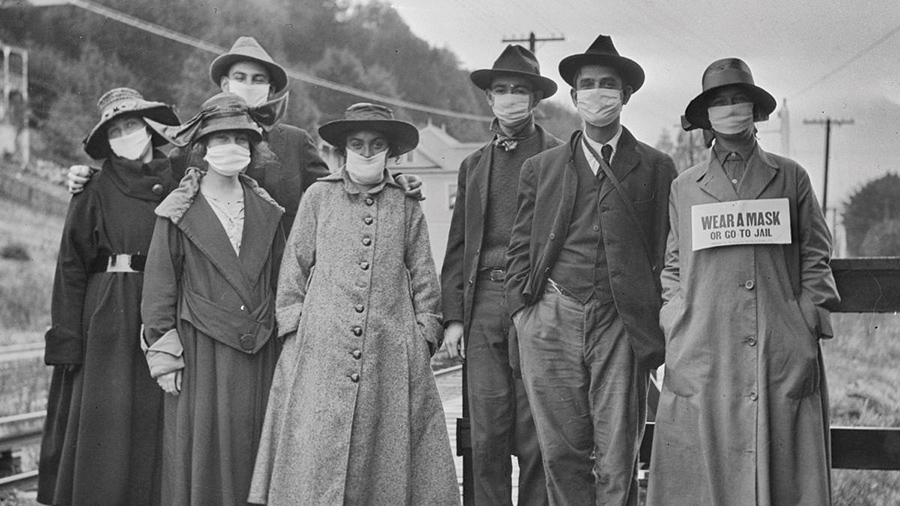 The Spanish Flu that broke out in 1918 took lives of 50 million people in the world in 2 years.
The Spanish Flu that broke out in 1918 took lives of 50 million people in the world in 2 years.
Lee, Sukjae: Agreeing with Professor Jang, IвҖҷd like to add that we need to take advantages of what we have now. One thing is the power of science. Science is being used to overcome COVID-19 from the tracking of the infection route to the prevention of the diseases as well as the development of the vaccines. The second is the attitude that we display in dealing with the problem. The scientific accomplishments that we have may not exert their power in the presence of an unscientific prejudice that hinders people from accepting them. The anti-vaccine issue is emerging from many parts of the world. Is it related to science itself or the attitude toward science? The answer is clearly the latter. Not only science but also humanities should be involved in the valuation of the confusing situation at present and the determination of the future directions.
Jang, Dayk: The quality you just mentioned is also necessary in the generation of human civilization. A civilization requires вҖҳecological intelligenceвҖҷ to understand whatвҖҷs happening and discover and apply the principles behind that. A civilization lacking the introspection about for whom the principles should be applied and why can easily collapse. We have seen during the current pandemic that вҖҳinfordemicвҖҷ is a huge global issue, as incorrect information is rapidly spread. We were able to hear stories that were contrary to the misinformation in the past. However, with the development of SNS and the algorithm, we may find ourselves in our own castles where we donвҖҷt need to hear any opinions that we donвҖҷt like to hear. So, we need to take efforts to solve the problems triggered by science and technology. One possible way is to try to pay attention to various viewpoints in order to understand othersвҖҷ thoughts that may be different from mine.
Power of Solidarity and Cooperation to Overcome Crisis
Lee, Sukjae: I learned that it was based on the same thought that you established the venture company for an educational platform, Transverse. I heard that your started it because you think that the Zoom-based education cannot replace the offline education.
Jang, Dayk: WeвҖҷve seen many problems, as the classes are taught online through Zoom during the COVID-19. The biggest problem, I guess, is that the online setting does not allow peer learning, which is to learn from friends and the younger and older students. We learn from the classes but we can learn from our colleagues, because we humans have the unique capabilities to empathize. A new platform is necessary to facilitate peer learning. We recently released a web-based comprehensive platform, called вҖҳEvoclass.вҖҷ We hope to develop it further to provide a new paradigm of online education.
Lee, Sukjae: I really respect your adventurous efforts. I was happy to talk with Professor Jang about various topics. I hope that this interview can give any help to our readers. The students are going through very hard and difficult times, but IвҖҷm sure that this, too, shall pass. What they experience now will be a great asset to live their future life for 80 years or even 100 years. In addition, IвҖҷd like to advice that our students donвҖҷt need to seek too big accomplishment during the university years. As we have endured well until now, we will be able to overcome the problems, while we encourage ourselves.
Jang, Dayk: I was also honored to spend the precious time with Professor Lee that I like very much. As you said, IвҖҷd like to ask our students to design their own lives in a more creative way, while enduring the difficult times. We may read different books to understand the various issues of our communities. We may listen to the stories of many people to reflect on what kind of future we can make individually in this confusing world. These efforts will provide a stepping stone to make a new leap toward the next stage of human history in the post-COVID-19 period.
